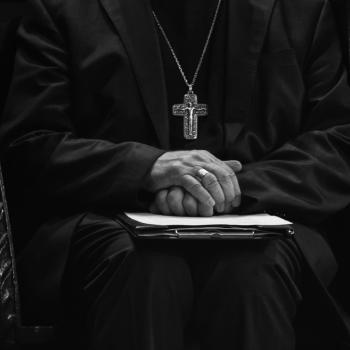Now Featured in the Patheos Book Club
The First Thanksgiving
What the Real Story Tells Us About Loving God and Learning from History
By Robert Tracy McKenzie
Book Excerpt
If you were born in the United States, chances are good that you have known about the Pilgrims from an early age. The story feels so familiar to us that we can easily lose sight of its drama. A tiny band of just over one hundred plain English men and women, seeking a better life, cross the storm-tossed Atlantic in the tiny Mayflower and arrive at the coast of present-day Massachusetts in late 1620. They bind themselves to one another as a self-governing political community and then go ashore to build a home in a strange and frightening new world. Having arrived on the eve of an unexpectedly cruel winter, they endure unimaginable hardships over the next few months, death claiming half of their number by spring. Yet through the mercy of God and the assistance of their new Indian neighbors, the remainder survive to reap a bountiful harvest in the fall of 1621, at which time they pause to celebrate the goodness of God with a special feast that we remember as the First Thanksgiving.
This "story that we already know" is, above all, a story about beginnings, and stories about beginnings are stories that explain.For generations, Americans have remembered that autumn feast not just as the origin of a treasured holiday but as integral to the very origins of the United States itself—the "land of the Pilgrims' pride," in the words of "My Country, 'Tis of Thee." From this perspective, the Pilgrims' story is "the first chapter in the American story."The United States may have been born in Philadelphia on July 4, 1776, but it was conceived a century and a half earlier at "Plimoth Plantation," where the values that would define the future nation were already embodied in the hardy band of men and women who, with their Indian neighbors, gave thanks for God's provision.
Beginnings are usually complicated, however, which is why our very use of the term "First Thanksgiving" should set off an alarm. I resisted putting the phrase in quotation marks earlier, but even a moment's reflection will convince us that we can't take it literally. Giving thanks is surely an ancient human practice, and no one seriously believes that the Pilgrims at Plymouth were the first to stop and thank their Creator for a bountiful harvest. We might say that the Pilgrims celebrated the "First American Thanksgiving," but there is abundant evidence that Native American peoples had thanksgiving celebrations as well. The Algonquian people, for example, participated in regular ceremonies linked to the crop cycle.
A more accurate expression, then, would be the "First American Christian Thanksgiving," but this wordier title is still off the mark. Spanish documents refer to a thanksgiving mass celebrated shortly after conquistadors landed at St. Augustine, Florida, in 1565—at a time when only two of the Pilgrims had even been born. Similarly, Texas historians insist that Spanish colonists celebrated thanksgiving with the Manso Indians near present-day El Paso in 1598, not early enough to beat out Florida but still a generation before the celebration in Massachusetts.
So I guess we could call the Pilgrims' celebration the "First American Protestant Christian Thanksgiving," but even this mouthful would be imprecise. It overlooks evidence of one thanksgiving service in 1564 near present-day Jacksonville, Florida, held by French Huguenots (who would soon be slaughtered by Spaniards from St. Augustine); one in 1607 at a short-lived English colony on the coast of Maine; and two others among English colonists in Virginia, in 1610 and 1619. This leads us, finally, to the more or less historically accurate label "First American Protestant Christian Thanksgiving North of Virginia and South of Maine."I don't expect it to catch on.
But why even mention this? Is the goal to debunk a treasured American tradition? Hardly! I love Thanksgiving. The mere mention of the holiday floods my mind with warm memories, a cataract of sights and sounds and smells and, above all, thoughts of people very dear to me. In my household, as likely in most, Thanksgiving has always been preeminently about family. I think of Thanksgivings past and I see my grandmother serving cornbread from her cast-iron skillet, my grandfather preparing to ask the blessing, my mother in her apron mashing potatoes, my father carving the turkey (and serving his new son-in-law the tail), my own small children dressed up as Indian maidens or as William Bradford.
Furthermore, I genuinely admire the Pilgrims, the group we commonly link with Thanksgiving's origins. They had their blind spots—as do we—but they were also people of faith and courage and hope, and there is much in their example to teach, admonish and inspire us. The last thing I want to do is to lessen the meaning of this special holiday. But I do want you to think about it...




